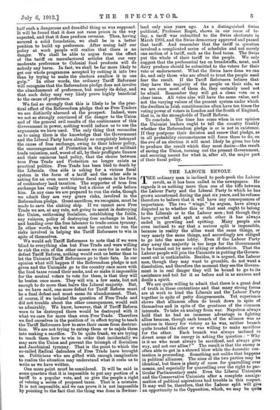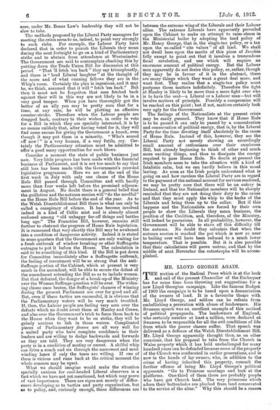THE LABOUR REVOLT. T HE ordinary man is inclined to pooh-pooh
the Labour revolt, as it has been called in the newspapers. He regards it as nothing more than one of the tiffs between the Labour Party and the Liberal Party to which he has grown accustomed during the past six years, and he refuses therefore to believe that it will have any consequences of importance. The two " wings," he argues, have always disputed. as to whether this or that seat ought to belong to the Liberals or to the Labour men ; but though they have growled and spat at each other it has always ended in growling and spitting. Many people are even inclined to say that a serious split is impossible, because in reality the allies want the same things, or very nearly the same things, and accordingly are obliged to go into the same lobby. Even if the Labour Party stay away the majority is too large for the Government to be turned out by mere sulking or abstention. That the Labour people will join the Unionists in putting the Govern- ment out is unthinkable. Besides, it is argued, the Labour men, though they may want to grumble, do not want a dissolution, and therefore the moment they see the Govern- ment is in real danger they will be bound to go to its assistance and toil for it as before and in as anxious and docile a spirit. We are quite willing to admit that there is a great deal of truth in these contentions and that many strong forces are at work to bind the Liberals and the Labour Party together in spite of petty disagreements. Yet experience shows that alliances often do break down in spite of themselves and in spite of the greatness of the common interests. To take an analogy from war. Napoleon always held that he had an immense advantage in fighting allies because, though each branch of the alliance was as anxious in theory for victory as he was, neither branch quite trusted the other or was willing to make sacrifices for the other. Each branch was always inclined to divert some of its energy in asking the question : " Why is it we who must always be sacrificed, and always give way, and not our allies ? " The result is that the enemy is often able to get in a shrewd blow while the domestic con- tention is proceeding. Something not unlike that happens in political alliances. The aims of the two parties may be identical, but there is plenty of room for quarrelling over means, and especially for quarrelling over the right to par- ticular Parliamentary seats. Even the Liberal Unionists and the Conservative Unionists after a complete amalga- mation of political aspirations had trouble in this respect. It may well be, therefore, that the Labour split will give an opportunity to the Opposition, which, we may be quite sure, under Mr. Bonar Law's leadership they will not be slow to take.
The methods proposed by the Liberal Party managers for meeting the crisis seem to us, indeed, to point very strongly to such risks. For example, the Labour Party have declared that in order to punish the Liberals they mean during the next fortnight to go on a kind of Parliamentary strike and to abstain from attendance at Westminster. The Government are said to eontemplate checking this by putting down the Trade Union Bill for discussion at this period. " That 'II fetch 'em back " they say triumphantly, and there is " loud Liberal laughter " at the thought of the score and of what cunning fellows they are in the Whip's room. Certainly the plan is ingenious, and it may be, we think, assumed that it will " fetch 'em back." But then it must not be forgotten that men fetched back against their will in this way are not likely to be in a very good temper. When you have thoroughly got the better of an ally you may be pretty sure that for a time, at any rate, he will be plotting an effective counter-stroke. Therefore when the Labour people are dragged back, contrary to their wishes, in order to vote for a Bill in which they are specially interested, it is by no means unlikely that, after having voted for it, they will find some excuse for giving the Government a knock, even though it may put them in a minority. " Who's scored off now " is a very human, if a very futile, cry. Cer- tainly the Parliamentary situation must be admitted to offer a good many opportunities for such blows.
Consider a moment the state of public business just now. Very little progress has been made with the financial business of Parliament, and it is not too much to say that still less has been made with the Government's crowded legislative programme. Here we are at the end of the first week in July with only one clause of the Home Rule Bill passed through Committee and with hardly more than four weeks left before the promised adjourn- ment in August. No doubt there is a general belief that the guillotine and the autumn session will "do the needful" on the Home Rule Bill before the end of the year. As to the Welsh Disestablishment Bill there is what can only be called a conspiracy of silence. It has become involved indeed in a kind of Celtic mist and is already almost reckoned among " old unhappy far-off things and battles long ago." The Franchise Bill, however, remains still further to obstruct the progress of Home Rule legislation. It is rumoured that very shortly this Bill may be awakened into a condition of dangerous activity. Indeed it is stated in some quarters that 'the Government are only waiting for a fresh outbreak of window breaking or other Suffragette outrages to put it before the House. The calculation is said to be something of this kind. If the Bill is put down for Committee immediately after a Suffragette outbreak, the feeling of resentment will be so strong that the anti- Suffrage portion of the Cabinet, which at present is very much in the ascendant, will be able to secure the defeat of the amendment extending the Bill so as to include women. But that defeated, the danger of a break-up of the Ministry over the Woman Suffrage question will be over. The widen- ing clause once beaten, the Suffragists' chances of winning during the present Parliament are over for good and all. But, even if these tactics are successful, it is obvious that the Parliamentary waters will be very much troubled. If, then, the Labour people are feeling very sore over the defeats which no doubt await them at Hanley and Crewe, and also over the Government's trick to force them back to the House when they want to be on strike, they will be grimly anxious to fish in those waters. Complicated pieces of Parliamentary finesse are all very well for a united party who have complete confidence in their leaders and are willing to dodge backwards and forwards as they are told. They are very dangerous when the party is in a condition of mutiny or unrest. A skilful whip can drive a coach and six through the narrowest and most winding lanes if only the team are willing. If one of them is vicious and runs back at the critical moment the whole concern may be upset. What we should imagine would make the situation specially anxious for cool-headed Liberal observers is a fact which we have not yet mentioned, but which may prove of vast importance. There are signs not merely of differ- ences developing as to tactics and party organization, but as to policy, and, curiously enough, these differences are between the extreme wing of the Liberals and their Labour allies. The extreme Liberals haveapparently prevailed upon the Cabinet to make an attempt to raise steam in the Ministerial boiler by adopting the land policy of Mr. Henry George, that is, the single-tax policy, or a tax upon the so-called " site values " of all land. We shall not dwell here upon the merits of this piece of Jacobin folly except to point out that it involves a tremendous fiscal revolution, and one which will require an enormous amount of political energy. But the Labour men apparently do not desire this policy, or, rather, though they may be in favour of it in the abstract, there are many things which they want a great deal more, and want first. They realize that a single-tax policy must postpone those matters indefinitely. Therefore the fight at Hanley is likely to be more than a mere fight over who is to have the seat—a Liberal or a Labour man—but will involve matters of principle. Possibly a compromise will be reached on this point ; but if not, matters certainly look very ugly for the Government.
The feelings of the Nationalists at the present crisis may be easily guessed. They know that if Home Rule is to be passed it can only be passed by a concentration and conservation of political energy, that is, by the Liberal Party for the time devoting itself absolutely to the cause of Home Rule. Instead of this, however, they see the Liberal Party not merely showing an exceedingly small amount of enthusiasm over their cumbrous Bill, but already beginning to think of other and much more exciting things, and thus to dissipate the energy required to pass Home Rule. No doubt at present the Irish members seem to take the situation with a kind of fatalistic calm, but we can hardly believe in this mood lasting. As soon as the Irish people understand what is going on and how careless the Liberal Party are in regard to the payment of the national account for services rendered, we may be pretty sure that there will be an outcry in Ireland, and that the Nationalist members will be sharply reminded that they are not doing their duty to the cause and that they must apply the whip to the backs of the Liberals and bring them up to the collar. But if this happens and the Nationalists are forced by their own people to show the Liberals they mean business, the position of the Coalition, and, therefore, of the Ministry, will indeed be precarious. In all probability, however, the Government will be able to stave off this difficulty till the autumn. No doubt they calculate that when the autumn session is reached the pot which is now so near to boiling over will have been reduced to a much lower temperature. That is possible. But it is also possible that their calculations will prove untrue, and that by the middle of next November the catastrophe will be accom- plished.



















































 Previous page
Previous page